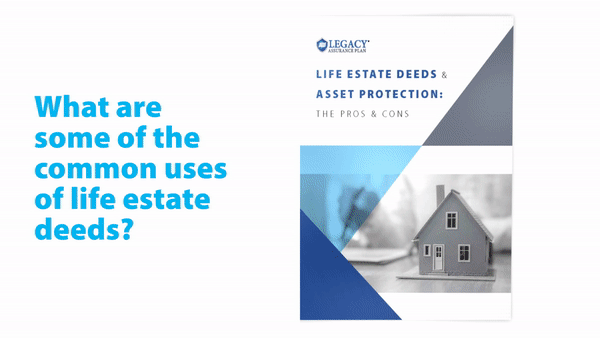The phone call comes at the worst possible moment. Your sister has passed away unexpectedly, and now your family faces emotional trauma and a potential property dispute that could have been avoided. Your parents had transferred their longtime home to you and your siblings years ago while retaining a life estate, but no one fully understood how that would affect everyone's rights if one of you died before your parents. Now, questions about property ownership threaten to divide your family at the worst possible time.
This scenario plays out in families across America because many people don't understand a crucial legal concept called remainder interests in property ownership. While most people focus on wills and trusts in estate planning, remainder interests represent a powerful but often misunderstood tool that can either protect or compromise your family's financial future, depending on how you use them.
What makes a remainder interest different from other property rights?
A remainder interest creates an immediate ownership right in property, even if you can't take possession right away. Imagine buying a house that you can't move into for several years – you own it now, but someone else has the right to live there for their lifetime. That's similar to how a life estate with a remainder interest works.
When parents create remainder interests for their children while retaining a life estate (and the right to live there as long as they like), they're not just making a promise about future inheritance – they're actually transferring real property rights immediately. This distinction has important implications when unexpected events occur, such as the death of one of the children before the parents pass away.

How does a life estate affect your family's property rights?
Think of a life estate like a temporary lease that the original property owners (usually the parents) keep for themselves. The parents can continue living in or using the property until they pass away, but they've already transferred the underlying ownership to their children as remainder interest holders. This arrangement offers both benefits and potential complications that families need to understand.
For example, consider a common situation: Parents own a family home worth $500,000 and want to ensure it passes to their six children while avoiding probate. They create a deed giving each child a remainder interest as tenants in common while retaining life estates for themselves. Each child immediately becomes a one-sixth owner of the property, even though they can't take possession until both parents pass away.
But what happens when life doesn't go according to plan? Let's follow our example through a series of events that a family might face:
- Mother passes away first, leaving father with his life estate.
- A year later, one of the six siblings dies unexpectedly.
- Father passes away the following year.
- None of the estates have gone through probate.

Some people might mistakenly assume that the deceased sister's share would automatically pass to the surviving siblings, leaving each with a 20% interest in the property. However, this assumption overlooks a crucial aspect of remainder interests: They represent present ownership rights that remain part of a person's estate when they die.
When the sister died, her one-sixth remainder interest became part of her probate estate immediately – even though both parents were still living. This property right passes to her heirs just like any other asset she owned. If she had two children, each would inherit half of her one-sixth interest, meaning each child would end up with a one-12th interest in the property.
If the sister died without children or a spouse, the situation becomes even more complex. Under most states' intestacy laws, her one-sixth remainder interest could pass to her parents – the very people who originally granted her the remainder interest. This creates a situation where the father could inherit back a portion of the property he had previously given away.
What are some strategies for property ownership and life estates?

Understanding your options for structuring life estates and property ownership interests can help prevent family conflicts and ensure your property passes according to your wishes. One alternative is creating remainder interests as joint tenancy with right of survivorship instead of tenancy in common. With joint tenancy, when one owner dies, their share automatically passes to the surviving owners, avoiding probate and keeping the property within the original group.
However, joint tenancy isn't always the best solution. If you want each child's share to pass to their own heirs rather than their siblings, tenancy in common might better serve your goals. The key is understanding these options before making a decision that could affect your family for generations.
Before creating remainder interests, you might want to identify your objectives and consider all scenarios. Your answers to the following questions can help determine the best structure for your remainder interests. Do you want to:
- Keep the property within a specific group of heirs?
- Allow each heir's share to pass to their own children?
- Maintain control over the property during your lifetime?
- Avoid probate?
Also, you should think through various possible situations and scenarios that might occur in the future:
- What if a remainder interest holder dies before you?
- What if they die without a will?
- What if they face bankruptcy or divorce? Each scenario could affect how your property ultimately passes to future generations.
Creating remainder interests requires careful consideration and legal guidance. While they offer powerful benefits, including potential tax advantages and probate avoidance, they also create immediate property rights that can't easily be changed later. Working with an experienced estate planning attorney can help ensure your remainder interests achieve your goals while protecting your family's interests.
Conclusion
Whether you're considering creating remainder interests or already have them in place, understanding how they work is crucial for protecting your family's financial future. The immediate transfer of ownership rights makes remainder interests fundamentally different from wills, trusts or transfer-on-death deeds. This distinction can either serve as a powerful tool for preserving family wealth or create unexpected complications if not properly structured.



